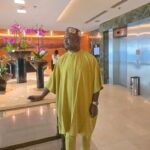As the judges read from the script written with the bilious ink of hate and pronounced the verdict of guilt for crimes no worse than breathing, the accused became icons of history. But more than that, they became the building blocks for the foundations of a perpetual monument against the forces of injustice, oppression and inequality.
Just as only the tallest trees survive a windstorm and strong buildings survive earthquakes, the men stood still, unbent and unbroken by the stony words of tyranny. Three decades later in the new South Africa, when the final bastions of legalistic inequality splintered, it reverberated with deafening sounds just like the walls of Jericho. The South African house of justice was build with blood of the innocent as its cement, their sweat was the water with which it was mixed and their bones were the pillars on which it stands. Nelson Mandela remained its strongest cornerstone.
The history of survival has been written with Mandela’s comrades who were physically incarcerated, but remained mentally alert and psychologically free even in the cauldrons of inequality. To paraphrase Fidel Castro’s classic History Will Absolve Me, one needs peace in a heavy heart to survive 27 years of exclusion in the world’s worst prison and under a regime against whom even docile beasts would have revolted. Mandela remained the beacon for the drowning nation, the gnawing conscience of an oppressive system. He carried that strength of character and the strength of will that only a man of extraordinary calling and build could muster.
Mandela’s long and eventful life is a medical demonstration of the peace the human body enjoys when it feeds on the untainted oxygen of forgiveness. With dignity and unequalled sense of character, Mandela not only survived, he remained unbent and unbroken against forces designed to break the will of the strongest of our ilk – apartheid. As time proved the justness of his cause, and he became a very important negotiator even in prison, Mandela again carried out that duty with the force of character and stoicism that only extraordinary beings with large hearts could shoulder without capitulating.
When he walked out of the prison into the presidency of a rainbow nation, Mandela realized the injurious futility of employing the principle of retribution. Even political power, the poisonous aphrodisiac that has transmogrified many African statesmen could not entice Mandela. Though it could have been justifiable, after all he was an African prince whose kingdom would have lasted his lifetime. He was also a globally acclaimed victim of injustice whose life presidency could not have been sufficient atonement for the 27 years of closet injustice foisted on him.
Symbolically, Mandela would not consider justified life presidency a trophy to grab with both hands; he soon relinquished power to a younger Mbeki and retired to the real life of an elder statesman. His life became an open book, so much so that rumours of his death became an obsessive silence disrupting the peace he embodies.
Mandela is not a man, though he has flesh, blood and the attributes of mere mortals. He is more than an icon. He is the goal that other men chase; the ideal that others wish to attain. Men like Mandela are scarce in history. His image is larger than life. This is why the world venerated him, even at his weakest moments. Not often does the world forgive the marital foibles of exalted mortals. In Mandela’s case, when his long marriage to Mama Winnie Madikizela-Mandela crumbled and he eventually settled for Graca Machel, an iconic widow, his towering height was not diminished nor was his image tarnished.
There are no words to truly eulogise the man, Nelson Rohlilahla Mandela. In the coming days and for generations until his memory becomes a legend to be doubted by man, Madiba would remain an ideal to be sought for, but never attained; a goal desired for a win, but never scored.
Goodnight Madiba. May the backscratchers who gather to pay you tribute leave with the shame of the ideal that they will never be. While his soul rests, let other mortals living on borrowed air, think about the legacy by which they would wish to be remembered.
 Join Daily Trust WhatsApp Community For Quick Access To News and Happenings Around You.
Join Daily Trust WhatsApp Community For Quick Access To News and Happenings Around You.


